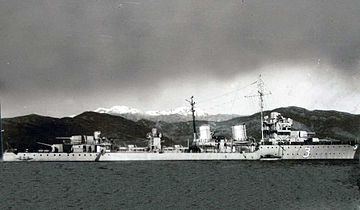- Milan Spasić (naval lieutenant)
-
Milan Spasić Born November 8, 1909
Belgrade, Kingdom of SerbiaDied April 17, 1941
Bay of Kotor, Kingdom of YugoslaviaAllegiance Yugoslav Royal Navy Years of service 1932-1941 Rank Naval Lieutenant Unit Destroyer Zagreb Battles/wars Invasion of Yugoslavia (World War II) Awards People's Hero of Yugoslavia Milan Spasić (November 8, 1909 – April 17, 1941) was a naval Lieutenant of the Yugoslav Royal Navy, which on the April War, along with his fellow Lieutenant Sergej Mašera blown up Destroyer Zagreb at Bay of Kotor besides Tivat to not fall into the hands of Italian Royal Navy (Regia Marina Italiana) and together with Mašera died.
Contents
Biography
Before World War II
Milan Spasić was born in Belgrade 1909, then part of Kingdom of Serbia. Spasić finished his elementary schooling in his native town, after that he attended high school here that he completed in the 1929 with honors. Afterwards he enrolled Naval Military Academy (VII class) in Dubrovnik together with future companion Sergej Mašera. After graduation in 1932 he remained on the Academy for specialization to torpedoes and mines.
April War and Death
In the time of outbreak of the short April War in 1941, Milan Spasić was a lieutenant on Destroyer Zagreb stationed in Dobrota (Bay of Kotor ), officer in charge for ship's torpedoes and mines. Destroyer Zagreb together with destroyers Belgrade and Dubrovnik was then the most recent Yugoslav Navy ship, and therefore the target of an air attack of five Regia Aeronautica bombers on 6 April, but the attack was carried out from a great height - and not suffered any damage. Italian aircraft bombed the Bay once again on 13 April, but even then did not made any damage to Zagreb. But on 15 April demoralized and smashed Yugoslav Royal Army asked for a truce, and the crews of ships stationed in the Bay of Kotor were instructed to do not open fire on the Axis forces and to surrender peacefully.
Indeed they were ordered to not destroy anything. Most of the sailors landed on the mainland, and on 17 April in the Bay of Kotor began to enter Italian forces. Then for the remaining crew members of Destroyer Zagreb (an approximately 14 h) were ordered to abandon ship.
But Milan Spasić along with his schoolmate lieutenant Mašera decided that the ship could not deliver to the Italians and refused the order of his commander Captain Nikola Krizomalija to abandon the ship. A little later they blew up the ship in the air with ordinary cords, but with the utmost sacrifice - lost of their lives.
After two explosions - Destroyer Zagreb badly damaged, sank to the shallow bottom. The following day, the fishermen find a corpse of Milan Spasić in the sea, he was buried along with Sergej Mašera on 19 April 1941, on the naval cemetery at village Savini near Herceg Novi. In their funeral many people came, and one detachment of the Italian army - who were impressed by the heroism of Spasić and Mašera and accompanied them with usual military honors.[1]
Legacy of Spasić & Mašera
Soon after their feat and their sacrifice reported by the British newspapers (Daily Mirror). The British Army have already in 1942 within their barracks in Malta erected a Commemorative plaque dedicated to Spasić & Mašera.[1] British journalist David Divine, in his book "Navies in Exile" (London: John Murray, 1944.) particularly stressed feat Spasić and Mašera. In the FPR Yugoslavia on the rank of the first postwar years - nobody say anything or written (and not even know) - about Spasić & Mašera, they probably did not fit the ideological form that only the communists have a proper concept and patriotism enough to resist the occupiers. Spasić and Mašera are probably not fit into that framework, King King Peter II, exactly in those years, was accused for collaboration with the Axis powers through the Chetniks. Indirectly these charges were related to all royal officers, and then it could not be explained how are these two young Lieutenants able to do such heroic act.
About them is started to timid write and speak until 1960s, following the democratization of the Yugoslavia (Economic reform 1964 /1965) The French have taken a film Flammes sur l'Adriatique (Flames on Adriatic) [2][3] on 1968, dedicated to this event by scenario of Meša Selimović directed by Alexandre Astruc and Stjepan Čikeš.
On the wave of these processes they have been declared People's Hero of Yugoslavia by decree of President Tito on 10 September 1973, on the occasion of 30 anniversary of Yugoslav War Navy.[4] After that, by their names are called some of the street in Yugoslav cities. In the Montenegrin town Tivat they have a monument in the city park. According to their names Youth Hostel near town Kotor, carry the name „Spasić - Mašera”.[5]
See also
- Sergej Mašera
- Destroyer Zagreb
References
- ^ a b Spasić i Mašera - put ka besmrtnosti, na portalu Brodovi.net (Serbo-Croatian)
- ^ About movie Flammes sur l'Adriatique, on site Cinema-francais
- ^ About movie Flammes sur l'Adriatique, on site Imdb
- ^ Spasić Save Milan na portalu Narodni heroji Jugoslavije (Serbo-Croatian)
- ^ Youth Hostel „Spasić - Mašera” on site kongresniturizam.com (Serbo-Croatian)
Bibliography
- Narodni heroji Jugoslavije, Mladost Beograd, 1975. godina (Serbo-Croatian)
- Tomislav Grgurević: Podvig Spasića i Mašere, 1983. Centar za kulturu, informisanje i dokumentaciju, Tivat (Serbo-Croatian)
External links
- Biografija Mašere na portalu Narodni heroji Jugoslavije (Serbo-Croatian)
- Spasić i Mašera - put ka besmrtnosti, na portalu Brodovi.net (Serbo-Croatian)
Categories:- 1909 births
- 1941 deaths
- Serbian military leaders
- Serbian military personnel killed in action
- Yugoslav military personnel killed in World War II
- Recipients of the Order of the People's Hero of Yugoslavia
- People from Belgrade
Wikimedia Foundation. 2010.

